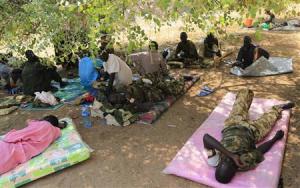South Sudan accuses rebels of mobilizing 'White Army'
By Carl Odera and Aaron Maasho1 hour ago

By Carl Odera and Aaron Maasho
JUBA (Reuters) - South Sudan accused rebels on Sunday of using a feared ethnic militia in renewed attacks despite a government offer of a truce to end two weeks of conflict in the young state.
A 25,000-strong force of the "White Army" - made up largely of ethnic Nuer youths who dust their bodies with ash - was advancing on the town of Bor, recaptured by loyalist forces last Tuesday, an army spokesman said.
Philip Aguer said government troops had begun clashing with White Army rebels loyal to former Vice President Riek Machar.
"We used gunships as they tried to advance towards Bor. They then dispersed and returned back," Aguer, Sudan People's Liberation Army spokesman, said by phone from South Sudan's capital, Juba, 190 km (120 miles) south of Bor by road.
Fighting has left at least 1,000 dead and split the east African country barely two years after it won independence from Sudan. It has also raised fears of an all-out civil war between the main Dinka and Nuer ethnic groups which could destabilize the fragile region.
The army said rebels on Sunday seized Mayom, a strategic town some 90 km (55 miles) from Unity state capital Bentiu, the main rebel stronghold. "You cannot capture Bentiu before seizing Mayom. Our troops will try to regain control," Aguer said.
The United Nations said the involvement of the White Army would "add a volatile and unpredictable ingredient into the precarious security situation" in South Sudan, putting unarmed civilians at even greater risk.
"South Sudan does not need another escalation of the crisis involving armed youth, pitching communities against communities. This can end in a vicious cycle of violence," U.N. Special Representative of the Secretary General Hilde Johnson, said in a statement on Sunday.
Machar made no immediate comment on the rebel force or on the government's offer of a ceasefire on Friday.
Witnesses spoke of panicked civilians fleeing Bor to escape another round of bloodletting.
The scene of a massacre of Kiir's Dinka ethnic group in 1991 by Nuer fighters loyal to Machar, Bor was retaken by government troops after several days of heavy fighting.
The White Army are recognized by the ash, prepared from burnt cow dung, with which they cover themselves to ward off insects. They are armed with machetes, sticks and guns.
Aguer said Machar's recruitment of the White Army was an "attempt to exploit the Nuer youth" and urged the rebel leader to influence the White Army youths to stop rampant killing.
"If (Machar) uses the same tactics as in 1991, then nothing will prevent devastation," Aguer added.
Joe Contreras, the U.N. spokesman in South Sudan, said a reconnaissance mission by a U.N. helicopter spotted a group of armed youths 50km from Bor but could not confirm their numbers.
Some 60,000 people are seeking refuge in U.N. bases across South Sudan, Contreras added."VERY SCARED"
The army said rebels were also mobilizing youths and armed civilians for another attack on Malakal, the capital of the oil-producing Upper Nile state. Rebels were pushed out of the town on Friday.
Among the civilians trying to escape Bor, capital of Jonglei State, was Juuk Mading.
"We are very scared," Mading, a father of four, said from a crowded river jetty as he waited in the fierce heat for a boat to cross the White Nile river to a neighboring state.
A Reuters cameraman who visited Bor on December 25, a day after the rebels were pushed out, said burnt corpses lay in the streets. Traumatized civilians spoke of mass killings by marauding youths.
As well as offering a truce, President Kiir's government said it would release eight of 11 senior politicians, widely seen to be Machar allies, arrested over an alleged coup plot against Kiir.
Defence Minister Kuol Manyang Juuk told Reuters that politicians in Juba were speaking to the White Army members to tell them that this is not an ethnic-based conflict and to persuade them to abandon their march on Bor.
(Additional reporting and writing by Drazen Jorgic; Editing by Ralph Boulton)

No comments:
Post a Comment